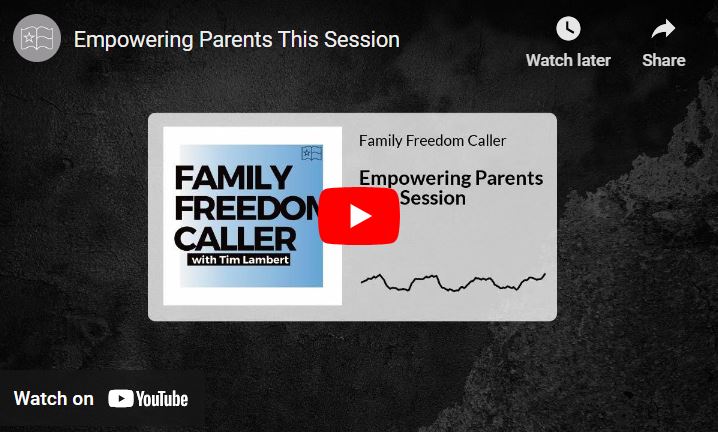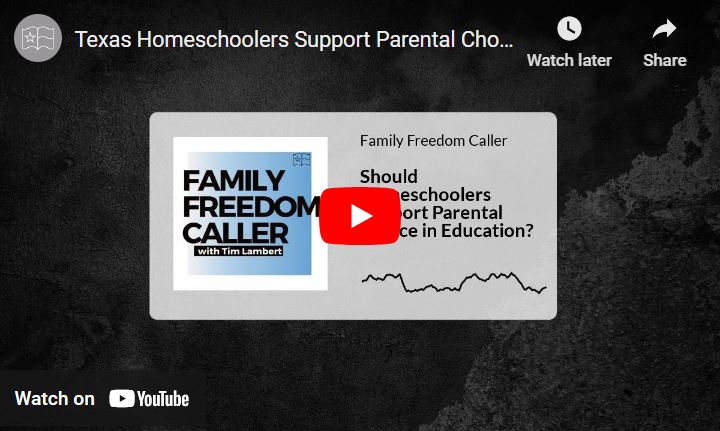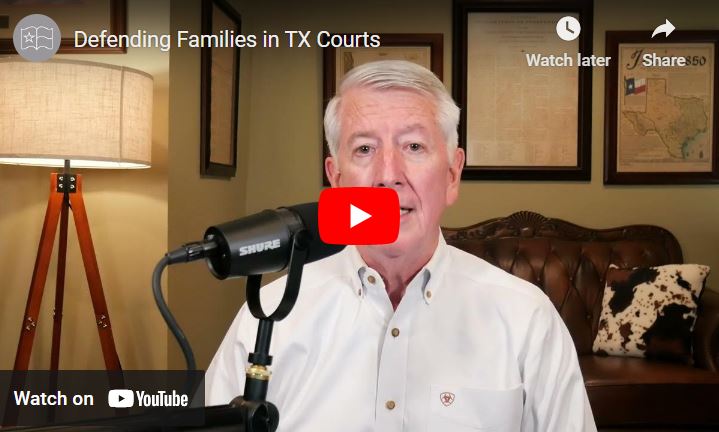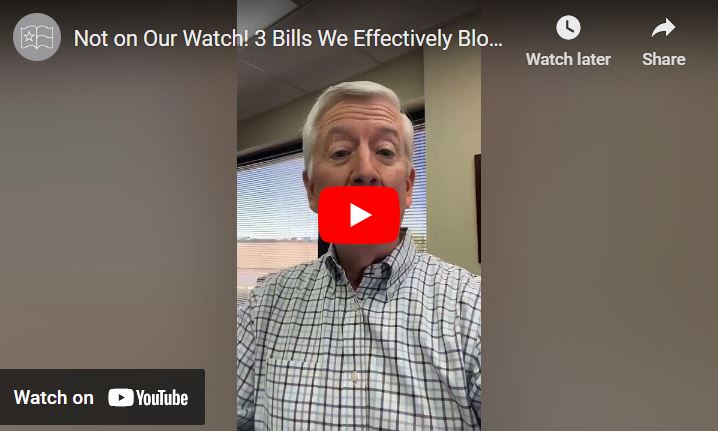Our Constitution provides for three branches of government, but it seems we have a fourth branch—regulatory agencies. The legislature creates laws, but their oversight and implementation are entrusted to regulatory agencies. Public policy set by these agencies is a great place to affect change.
In Texas, laws related to child protection cases are implemented and regulated by the Department of Family and Protective Services (DFPS). Over the years, this enabled THSC to successfully negotiate several changes to CPS policy on behalf of home schoolers and parents.
THSC has exchanged letters with recently appointed DFPS Commissioner Whitman regarding several critically important issues facing home schoolers. Although we have not completing agreed between THSC and DFPS on the best solutions, THSC negotiated two important changes to CPS rules that benefit home schooling families:
- Home schooling cannot be a reason for investigation
- CPS must inform the parent of specific allegations
Homeschooling as the Sole Reason for an Investigation
In our first letter to Commissioner Whitman, we expressed our concern over the language in Statewide Intake (SWI) Handbook 4491, which governs the CPS caseworkers procedure when investigating a family that homeschools. In our experience, the language did not protect homeschool parents from being illegitimately targeted during CPS investigations simply for homeschooling.
In Commissioner Whitman’s prompt reply, he accepted our recommendation and directed his staff to update the language to read as follows (updated language in bold):
Reports involving the abuse or neglect of home-schooled children are assessed based on the same criteria and intake guidelines as any other CPS report. That parents choose to homeschool their child or send their child to another private or public school does not constitute abuse or neglect. Home schools are not subject to inspection, monitoring, or regulation by the Texas Education Agency or by local school districts.
THSC was very pleased with this updated language and we believe that it will help to protect homeschool parents and students from frivolous CPS investigations that are based solely on their education choices.
Parents Should Know the Allegations
Additionally, we expressed concern that CPS was failing to follow state law requiring investigators to disclose the specific allegation to the parent “on first contact.” While the Commissioner ultimately disagreed with us on the best solution, he did issue a policy update that we believe will help clarify the scope of a caseworker’s authority to withhold from the parent information that they believe to be critical to the integrity of the investigation.
DFPS updated the language of CPS Handbook 2242 to read as follows:
At the first contact with parents or alleged perpetrators, the caseworker must identify himself or herself and:
- explain the role and responsibilities of the department;
- explain the reason for contact; and
- inform the individuals of the general nature of the report and each allegation and obtain their response; however, if the child has not been interviewed at the time of the first contact, the caseworker must not disclose any information or details of the case that are likely to:
- cause harm to the child,
- influence the child’s interview, or
- compromise the integrity of the investigation.
In the end, this policy change helps to clarify the rules requiring caseworkers to disclose specific allegations to a parent.
Two Paths to Reform
THSC will continue to work with Commissioner Whitman and TDFPS to protect homeschoolers and parents who are investigated by CPS. In tandem, we will introduce the Parent-Child Protection Act, a CPS reform bill, in the 2017 legislative session. THSC has been meeting and discussing with legislators many of the problems with current CPS law to gather support for the Parent-Child Protection Act.
What You Can Do:
- Be prepared if CPS should ever knock at your door. Here are a few suggestions.
- Click the share buttons below to help us inform more Texas families and home schoolers about the need for CPS reform. Many people are unaware of the numerous problems with current CPS law (see also here and here).
Join THSC in Keeping Texas Families Free.
Our Constitution provides for three branches of government, but it seems we have a fourth branch—regulatory agencies. The legislature creates laws, but their oversight and implementation are entrusted to regulatory agencies. Public policy set by these agencies is a great place to affect change.
In Texas, laws related to child protection cases are implemented and regulated by the Department of Family and Protective Services (DFPS). Over the years, this enabled THSC to successfully negotiate several changes to CPS policy on behalf of home schoolers and parents.
THSC has exchanged letters with recently appointed DFPS Commissioner Whitman regarding several critically important issues facing home schoolers. Although we have not completing agreed between THSC and DFPS on the best solutions, THSC negotiated two important changes to CPS rules that benefit home schooling families:
- Home schooling cannot be a reason for investigation
- CPS must inform the parent of specific allegations
Homeschooling as the Sole Reason for an Investigation
In our first letter to Commissioner Whitman, we expressed our concern over the language in Statewide Intake (SWI) Handbook 4491, which governs the CPS caseworkers procedure when investigating a family that homeschools. In our experience, the language did not protect homeschool parents from being illegitimately targeted during CPS investigations simply for homeschooling.
In Commissioner Whitman’s prompt reply, he accepted our recommendation and directed his staff to update the language to read as follows (updated language in bold):
Reports involving the abuse or neglect of home-schooled children are assessed based on the same criteria and intake guidelines as any other CPS report. That parents choose to homeschool their child or send their child to another private or public school does not constitute abuse or neglect. Home schools are not subject to inspection, monitoring, or regulation by the Texas Education Agency or by local school districts.
THSC was very pleased with this updated language and we believe that it will help to protect homeschool parents and students from frivolous CPS investigations that are based solely on their education choices.
Parents Should Know the Allegations
Additionally, we expressed concern that CPS was failing to follow state law requiring investigators to disclose the specific allegation to the parent “on first contact.” While the Commissioner ultimately disagreed with us on the best solution, he did issue a policy update that we believe will help clarify the scope of a caseworker’s authority to withhold from the parent information that they believe to be critical to the integrity of the investigation.
DFPS updated the language of CPS Handbook 2242 to read as follows:
At the first contact with parents or alleged perpetrators, the caseworker must identify himself or herself and:
- explain the role and responsibilities of the department;
- explain the reason for contact; and
- inform the individuals of the general nature of the report and each allegation and obtain their response; however, if the child has not been interviewed at the time of the first contact, the caseworker must not disclose any information or details of the case that are likely to:
- cause harm to the child,
- influence the child’s interview, or
- compromise the integrity of the investigation.
In the end, this policy change helps to clarify the rules requiring caseworkers to disclose specific allegations to a parent.
Two Paths to Reform
THSC will continue to work with Commissioner Whitman and TDFPS to protect homeschoolers and parents who are investigated by CPS. In tandem, we will introduce the Parent-Child Protection Act, a CPS reform bill, in the 2017 legislative session. THSC has been meeting and discussing with legislators many of the problems with current CPS law to gather support for the Parent-Child Protection Act.
What You Can Do:
- Be prepared if CPS should ever knock at your door. Here are a few suggestions.
- Click the share buttons below to help us inform more Texas families and home schoolers about the need for CPS reform. Many people are unaware of the numerous problems with current CPS law (see also here and here).
Join THSC in Keeping Texas Families Free.










